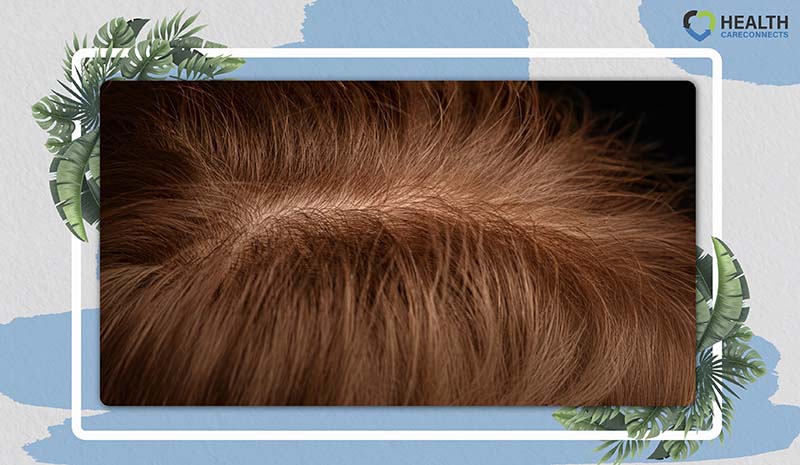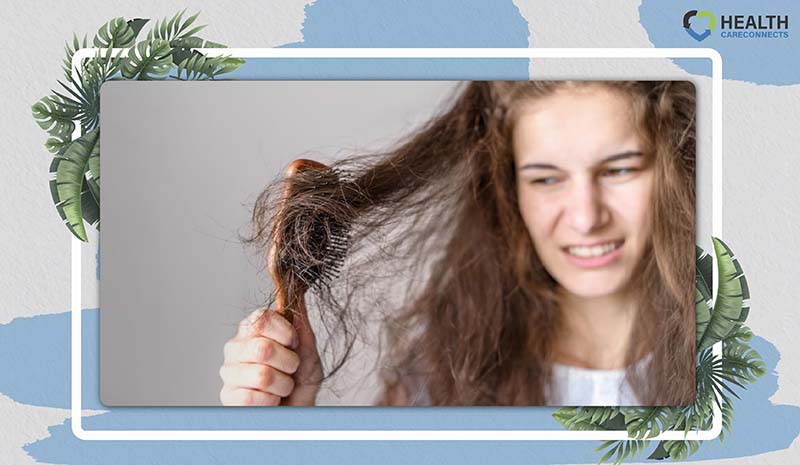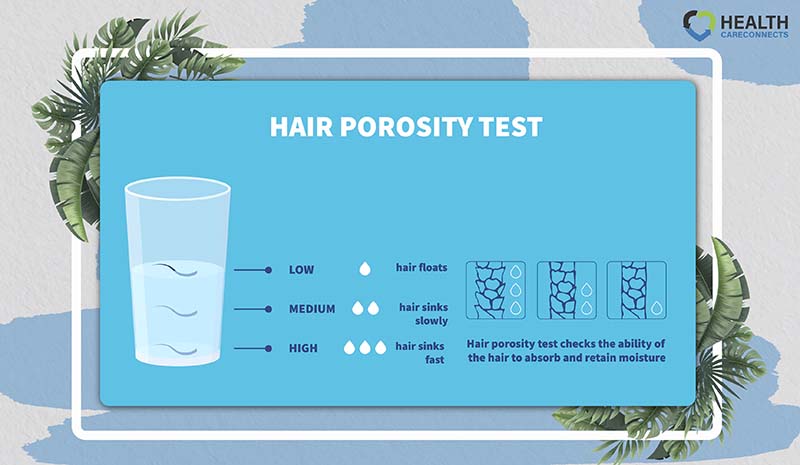To maintain the health of high porosity hair, choose hair care products that contain “heavier” ingredients like oils or butters. Hair porosity refers to how readily your hair absorbs and retains moisture. Depending on its ability to do so, your hair may be classified as having high, medium, or low porosity.
High porosity hair is adept at absorbing water, oils, and other substances. However, due to its highly porous nature, it may struggle to retain moisture, unlike other hair types.
For those wondering “Is high porosity hair bad?” You must understand that although there are some challenges in maintaining moisture, with the right management techniques, you can keep your hair healthy and vibrant. If you’re looking for effective ways to care for high porosity hair, this article can provide the guidance you need.
Is High Porosity Hair Bad?
Understanding hair porosity is essential for maintaining healthy and beautiful hair. Porosity refers to the number and sizes of holes and cracks in your hair strands, which affect their ability to absorb and retain moisture. It determines how easily your hair can take in and hold onto water, oils, and other products.
Having high porosity hair suggests that your hair strands likely have more cracks and holes in the cortex, and your cuticles may be raised or missing. This can lead to various issues, including weak strands prone to breakage, persistent split ends, and frustrating frizz that’s hard to control.

How to Identify High Porosity Hair
Identifying high porosity hair involves recognizing specific signs and symptoms that indicate this hair type. One common indicator is the rapid absorption of water or hair products, as high porosity hair contains gaps in the cuticle layer, enabling swift moisture intake. Additionally, excessive frizz is often present due to moisture easily escaping through these openings, resulting in dry, flyaway-prone hair.
High porosity hair typically feels rough and brittle to the touch. This rough texture arises from raised cuticles hindering moisture retention, leading to dehydration and increased breakage. Moreover, high porosity hair frequently exhibits split ends due to its inability to effectively retain moisture.
If your hair quickly dries after washing or styling, struggles to retain moisture, appears lackluster despite product use, and feels rough or brittle, these are potential indicators of high porosity hair.
Understanding these signs enables you to tailor your hair care routine accordingly, addressing the specific needs of high porosity hair. By doing so, you can promote healthier-looking locks that better retain moisture and withstand daily wear and tear.
Reasons Why Your Hair Has High Porosity
While genetics play a significant role in determining hair porosity, the exact mechanisms behind this process remain largely unknown, as noted by Trefor Evans, Ph.D., Institute Fellow at TRI Princeton. Evans emphasizes the complexity of how hair growth is governed by the body’s physiology, stating, “How your hair grows is down to your body’s physiology, and there are so many things that control the body’s physiology.”
In addition to genetic factors, other elements contribute to high porosity hair. Exposure to UV radiation from the sun, failure to use a heat protectant before styling, and chemical processes like coloring and bleaching can all contribute to increased hair porosity. According to Dove Partner & Celebrity Hair Stylist Lacy Redway, while genetics primarily determine porosity, external factors such as chemical treatments and heat damage can also play a significant role in altering hair porosity levels.

How to Take Care of High Porosity Hair?
When managing high porosity hair, the primary aim is to preserve moisture, close the cuticle layer, and minimize damage. Here are some effective tips for caring for high porosity hair:
- Regular Conditioning: Consistent conditioning is crucial to restore and retain moisture. Use a deep conditioner or hair mask at least once a week, leaving it on for 15-20 minutes to allow deep penetration into the hair cuticles.
- Cold Water Rinse: Finish your shower with a blast of cold water. Cold water helps seal the cuticle layer, locking in moisture from your conditioner or hair mask.
- Leave-In Conditioner: High porosity hair thrives on moisture, so don’t hesitate to use a leave-in conditioner. It provides continuous hydration throughout the day, combating dryness and frizz.
- Moisture Sealant: After applying leave-in conditioner, seal the cuticle closed with an oil or serum. This step not only locks in vital moisture but also imparts a smoother, shinier appearance to the hair, making it more manageable.
- Avoid Harsh Treatments: Steer clear of frequent color-processing, bleaching, or chemical treatments, as they elevate the hair’s porosity by lifting the cuticle layer.
- Limit Heat Styling: Excessive heat styling exacerbates cuticle damage. If heat styling is unavoidable, ensure you always use heat protection and refrain from exceeding 350 degrees Fahrenheit to prevent further harm to the cuticle layer.

How to Tell If Your Hair Is High Porosity?
You can easily determine your hair’s porosity using a simple test with a dry, freshly washed strand of your hair and a clear glass or bowl of water.
Hair Porosity Test:
- Fill a clear glass or bowl with water.
- Place a strand of your hair in the water.
- Observe how quickly the hair sinks to the bottom.
Results:
- High porosity hair will sink to the bottom rapidly.
- Medium porosity hair is likely to float in the middle of the glass for some time before sinking.
- Low porosity hair will float at the top for a while before gradually sinking.
Understanding your hair’s porosity enables you to tailor your hair care routine and choose products and ingredients that are best suited to your hair’s needs.

FAQs
Is coconut oil good for high porosity hair?
Yes, coconut oil is beneficial for high porosity hair. It penetrates the hair shaft, sealing in moisture and reducing protein loss during washing, which helps maintain healthy, moisturized hair.
Is rice water good for high porosity hair?
Rice water can benefit high porosity hair due to its amino acids and vitamins that strengthen hair and improve elasticity. However, high porosity hair sensitive to protein should use rice water sparingly to prevent stiffness and breakage.
Is protein good for high porosity hair?
Protein treatments are beneficial for high porosity hair as they fill in gaps in the hair’s cuticle, reducing moisture loss and enhancing overall structure.
However, balance is key, as excessive protein can make hair hard and brittle. Use protein treatments as needed, monitoring the hair’s response.
Conclusion
Managing high porosity hair effectively is key to keeping it healthy and looking great. This hair type is susceptible to damage and breakage, but with the right care strategies, you can preserve its quality.
First, determine your hair’s porosity so you can choose products and treatments that enhance moisture retention and strengthen the hair. Hydration is essential; make it a routine to use deep conditioners and oil treatments to keep your hair well-nourished.
Embrace protective hairstyles like braids or twists to minimize styling damage and breakage. Regular trims are also crucial to prevent split ends and maintain a healthy appearance.
By emphasizing proper moisturization, protective styling, and regular maintenance, you can improve the condition of high porosity hair. If you are wondering “Is high porosity hair bad?” then despite the challenges, with careful management, your hair can still grow.
For those seeking more information and honest product reviews, I recommend visiting HealthCareConnect. Explore firsthand experiences from users and gain valuable insights to help inform your decision.

Dr. Joyce Slater: Your Guide to Informed Health Choices
Dr. Joyce Slater shines as a distinguished expert in the field of nutrition and public health. Contributing her vast expertise to HealthConnectbc, she embodies a deep-seated passion for enhancing public well-being. As a respected figure in her field. Dr. Slater’s academic journey and professional achievements are nothing short of inspirational.
Holding a significant position as a researcher and educator, Dr. Slater has delved deeply into the intricacies of food literacy and nutritional science. Her work, prominently featured in numerous esteemed scientific publications, underscores her dedication to expanding our understanding of food’s role in health and society.
At the heart of Dr. Slater’s professional ethos is a profound desire to positively impact individual lives through education and research. She often says, “Empowering people with the knowledge to make healthier choices is the most rewarding aspect of my work.” This principle is the cornerstone of her involvement with HealthConnectbc, where she strives to provide reliable and practical health advice.
Dr. Slater’s contributions to HealthConnectbc are multifaceted: academically, she offers insights into the complex world of nutrition and health, enhancing both public understanding and professional practices. Additionally, she is instrumental in guiding and inspiring the next generation of health professionals, thus fostering future excellence in the field.
Juggling rigorous research with her educational duties, Dr. Slater demonstrates an unwavering commitment to her profession. Her approachable nature and genuine concern transcend the confines of academia, touching the lives of everyone she interacts with. Dr. Slater looks forward to continuing her journey of discovery and education, dedicated to the ongoing improvement of public health and nutrition.
At HealthConnectbc, Dr. J. Slater is not just a contributor; she is a guiding light, dedicated to enlightening and motivating individuals towards a healthier and more informed lifestyle.
PUBLISHED ARTICLES
- Food literacy competencies: A conceptual framework for youth transitioning to adulthood (2018)
- Self-perceived eating habits and food skills of Canadians (2016)
- Challenges to acquiring and utilizing food literacy: Perceptions of young Canadian adults (2016)
- Socio-demographic and geographic analysis of overweight and obesity in Canadian adults (2009)
- Sustainable well-being: Concepts, issues, and educational practices (2014)

